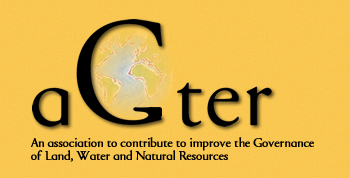|
|
||||||||||||||
|
|
La asociación AGTER coordina una red internacional de personas que intercambian y reflexionan juntas para mejorar la gobernanza de la tierra, del agua y de los recursos naturales. La red pone a disposición de todos una selección de datos y trabaja a la formulación de propuestas y alternativas frente a los grandes desafios actuales. Este boletín trimestral les presenta las ultimas informaciones de nuestro sitio web : www.agter.asso.fr. Cada boletín esta introducido con un editorial escrito por un miembro de la red de AGTER. Regarding the importance of agrarian transformations going on in Ukraine and other countries of the former Soviet Union, this region of the world has to be a matter of concern for AGTER. In the last twenty years, this region has known major changes that have totally transformed the agriculture of this region and propelled these nations into the group of countries that could contribute to increase the world agricultural production. These changes have also kept on maintaining a dualism already pervasive in the Soviet agriculture with the coexistence of very large agro-structures and a myriad of micro-farms (plots of the old regime). While agro-firms control most of the land through tenancy particularly favorable to the lessee, lessors (former workers of Kolkhozes and Sovkhozes) are operating micro-farms (0.5 ha) without means in cramped villages and no possibility of expansion. Nevertheless these very small exploitations continue to produce the bulk of domestic production of milk, vegetables and potatoes, and an important part of the production of poultry and pigs. Between these two poles of the Ukrainian countryside, few medium-sized farms have emerged since the decollectivization but they are struggling to keep on operating in the rural areas. How a land policy, including regulation of access to land, could facilitate the expression of the productive potential of these micro-farms, while maintening and creating of a maximum of productive employment in the countryside? The last meeting organized by AGTER, 30th of November, dealt with this subject. A video clip of 20 minutes will be available on the website soon. On the topic of agrarian reform, Olivier Delahaye offers us an article in which he assesses the application of the Act on Land and Agricultural Development of 2001 (revised in 2005 and 2010) in Venezuela, despite the incomplete and unreliable official sources. In the case of Ecuador, where colonization of "virgin" lands of the Pacific coast and part of the Amazon can hardly be maintained to face the "land thirst", the debate on land reform has been revived. Michel Laforge gives us his analysis of the situation in an article translated from a recent book on land reform. Finally, Marta Fraticelli published three articles on agrarian history of Italy and how were implemented land reform. About the large-scale land appropriation in the world, AGTER has made available the official document of the French position (Interministerial Group on Food Security) on land grabbing. This document lists some of the proposals developed by AGTER inside the Technical Committee "Land Tenure and Development" and that go well beyond the recommendations of the Commité d’Action Stratégique (CAS) connected to the Prime Minister, in June 2010. Finally, we have published a first set of worksheets to question, understand and act on land tenure in West Africa. This series of sheets developed under a project funded by the French Cooperation (AFD), aims to help those involved in the development and implementation of land policies in West Africa to better understand the complexity of land issues, and to benefit from recent experiences and reflections. The French, Spanish, and English articles and videos that we present here differ.
|
AGTER. Addres: 45 bis, avenue de la Belle Gabrielle, 94736 NOGENT SUR MARNE CEDEX, FRANCE
Telephone: +33(0)1 43 94 72 59 / +33(0)1 43 94 72 96
E-mail: agter@agter.org




